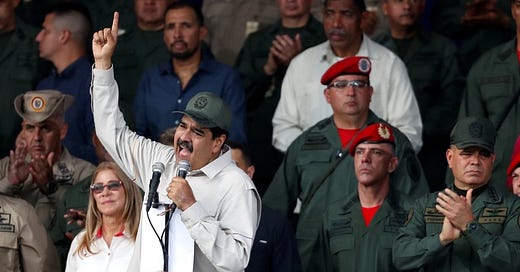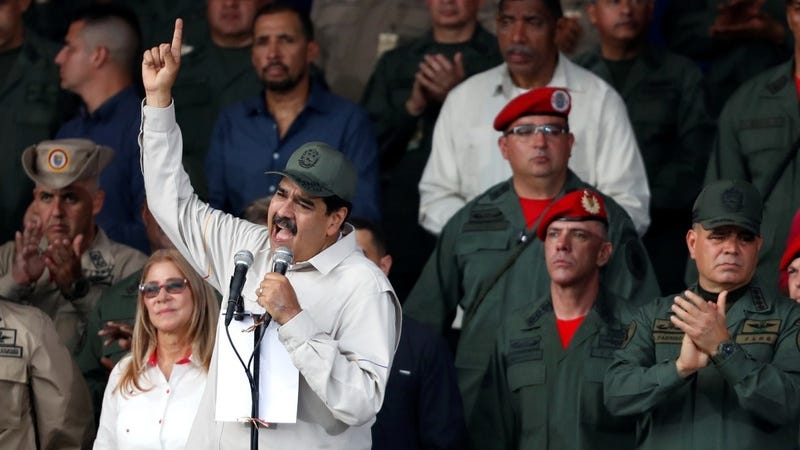
Nicolas Maduro now rules a land of chronic hunger, horrific crime, terrible fear, and mass exodus. How does he maintain his dictatorship? With a pact of steel between his ruling party, the military, the secret police, and on-site foreign allies – especially Cubans. You would have to be mad to think that Maduro’s doing all this for the good of his people, or the good of the world. His only credible motivation is power-lust gone wild. Maduro is a pervert for power.
He’ll never admit this, of course. He still claims he’s doing it all for the people and the higher good. Here’s Maduro in an interview this February:
Venezuela is a country with dignity. We are patriots, revolutionaries. We have an ideology, that of Simon Bolivar. Our movement came from the depths from the Venezuelan people. We’ve been governing democratically for 20 years. Everything that we are, everything that we have, we have because of the popular vote.
Which raises a deeper question. Namely: Deep in his soul, when did Maduro stray from the path of decency?
For Maduro’s former fans, it’s tempting to sigh, “Power corrupts.” Power turns a good man bad. He – like his mentor Chavez – started out as an idealist. Yet ironically, he ended up a tyrant.
On reflection, however, this “ironic” account is absurd. Think about the nicest, sweetest person you personally know. Can you seriously imagine that this person, given power, would forge a brutal police state, destroy the economy, and cling to power with fire and blood? I can’t.
Indeed, think about the average person you know. You can probably imagine that this person would go along with great evil out of cowardice. Still, would the average person you know take the initiative to commit these horrors? That doesn’t make sense to me.
The lesson: Maduro was never an idealist. Indeed, he was never an average person. The average person in his shoes would have done far less evil, and relinquished power long ago. What Maduro has done reveals what Maduro has always been: insatiably hungry for power.
So what? Well, while this is all clear in hindsight, Maduro used to have millions of fans all around the world. Millions of fans who took his rhetoric at face value. Millions of fans who thought he was a noble man. And these fans would have called me paranoid and unfair for calling their idol a power-luster.
The fans’ error would have been understandable if Maduro were the first politician to start with idealistic rhetoric and end in savagery. In fact, however, history provides countless examples of this pattern. Which means two things.
First, while extreme power-lusters are a small fraction of humanity, they are a large fraction of successful politicians.
Second, regular human beings are awful at the detection of extreme power-lusters. When humans hear flowery words, their impulse is to take them at face value, instead of reminding themselves, “That’s just what a power-luster would say – and politics is packed with power-lusters.”
You could object, “Well, popular gullibility is for the best. If the man in the street assessed politicians realistically, political progress would be almost impossible.” The tempting reply is, “Yes, but political disaster would be almost impossible too.”
This reply, however, gives gullibility too much credit. Imagine a world where people were ever-mindful of politicians’ proclivity for power-lust. What would happen? Politicians would compete for popularity by promising and doing things that power-lusters hate to do. Things like: Respecting individual freedom, welcoming dissent, defining crime narrowly, heeding international criticism, avoiding even the appearance of demagoguery, and yes – shrinking government and cutting regulation. And given the documented dangers of politicians’ power-lust, that is just what anyone who cares about human welfare should be hoping for.
The post appeared first on Econlib.

















I don't know much about Maduro specifically, but my model of dictators isn't necessarily that they're consciously evil or deliberately callous to the suffering of their people for their own personal benefit. Maybe a little bit, probably a lot more so than the nicest person you know, but not necessarily much more so than the average person.
Instead I think they practice a lot of bad epistemology and are totally delusional about what are the best policies to enact. Even as their policies bring down their nation, I think they delusionally find other stuff to blame, like America or "the Jews" or evil capitalists or communist saboteurs or what have you, varying by specific dictatorship. There are lots of examples of dictators taking actions that aren't only bad for their nation, but are bad for themselves and lead to the weakening of their regime.
That's part of why I really like the idea of futarchy, making people put money on the policies they support, so the people with the actual succesful policies make more money and have more influence in the future. Good intentions aren't enough, good epistemology is necessary too.
How much contemporary info do we have on Maduro or Chavez before they became leaders? Chavez a lot, I assume. Would you be able to create a list of traits/statements that, using only pre-leadership info, identify a high % they’d be bad leaders? And one that, when applied to other politicians (either from Venezuela or elsewhere) had a high % of excluding those that we know ended up not being tyrants? And how to disentangle that from local institutions/laws/restraints? It’s easy to imagine a country with more robust protections against authoritarianism that, even having elected a Chavez, would have heavily limited his bad results.